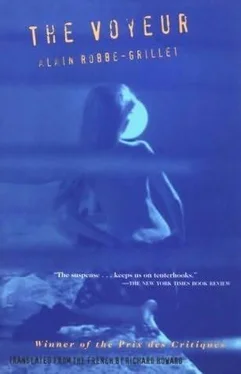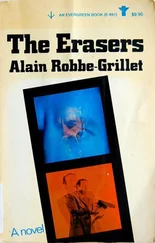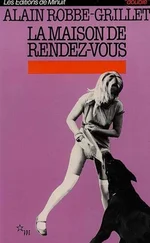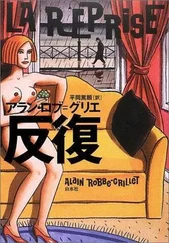He turned around and realized that the path he was on was the very one he had taken less than an hour before, and on his bicycle yesterday afternoon. After several detours and devious curves, the junction had occurred without his noticing it.
He was not a little troubled by this discovery: at present he doubted the existence of a short cut from the town to the hollow in the cliff, whereas all his previous reflections had posited the inevitability of it. Of course the mistake delayed him still longer: he turned up for lunch almost forty minutes later that he had expected to.
This kind of inexactitude irritated as well as disturbed him, since the café had only agreed to serve him his meals as a particular favor, in the absence of any regular restaurant at this time of year. When he walked in, the proprietor pointed this out to him politely, but firmly. Mathias, breathless from running, was put out of countenance.
“I went over to see my old friends the Mareks,” he gave as an excuse. “You know, near Black Rocks. They kept me longer than I expected…”
He immediately realized the imprudence of his words, and fell silent without adding—as he had at first intended—that Robert Marek had asked him to stay for lunch and that he had refused because he was expected here. Perhaps Robert Marek himself was leaving the café “A l’Espérance” at this very moment; it would be better not to get in any deeper. This one he had already exposed him far too dangerously to a formal denial that risked awakening all kinds of suspicion…
“You came by the road from the big lighthouse, didn’t you?” asked the proprietor, who had been waiting for his guest in the doorway.
“Yes, of course.”
“Since you were walking, you could have taken a much shorter way. Why didn’t anyone show you?”
“Probably they were afraid I might lose my way.”
“It’s simple enough, you just take the path behind the fields all the way. It begins here, out back.” (Vague gesture of the right arm.)
It was essential for Mathias to change the subject in order to avoid any further questions about such places, or the people he had met at the farm. Fortunately the proprietor, more talkative today, shifted the conversation of his own accord to the obvious subject: the accident which had cost the youngest Leduc girl her life. Dangers of the cliff, brittleness of the rock, treachery of the ocean, disobedience of children, always doing what they’re not supposed to do…
“To tell you the truth, it’s nobody’s loss, I’m sorry to say. She was a real devil! A wild animal!”
Mathias listened to this peroration with only half an ear. The business no longer interested him. The false step he had made so lightly only a moment ago preoccupied him too much: he was in constant terror his interlocutor would make some new allusion to it. A single idea possessed him: to gulp down his lunch as soon as possible and actually visit that damned farm—finally—in order to transform his lie into a mere anticipation of the truth.
Nevertheless, once out on the quay again—calmer now, feeling himself out of danger—he did not start looking for the sliQrt cut across the fields mentioned by the proprietor as well as by old Madame Marek. He turned left and headed, as usual, toward the little triangular square. He was beginning to mistrust short cuts.
He preferred the large flat stones along the quay to the uneven cobbles: it was easier to walk there. But he did not waste time staring at the exposed strip of mud—two or three yards below—which the rising tide had not yet covered. He also renounced the next temptation without difficulty:—the hardware shop¬window. In the middle of the square the monument to the dead seemed more familiar under this cloudy sky. The high circular fence with its vertical rails cast no shadow on the surrounding sidewalk. The statue on its rock pedestal was still looking toward the open sea, but no anxiety showed on its granite face. The salesman was merely going to visit some old acquaintance from whom, moreover, he would have nothing particularly startling to hear—neither good nor bad—in the way of gossip, since the old woman had already told him all their important news. His eyes happened to fall on the gaudy advertisement on the bulletin-board. He turned his head away. He was merely going to pay a visit… etc.
The streets were empty, which was not surprising: everyone on the island was eating dinner; it was served much later here than on the mainland; the proprietor had waited on Mathias a little ahead of time so that he himself could eat at his usual hour. The last house as you left town had its door and windows closed, like the others. The silence was reassuring, reassuring, reassuring…
Having climbed up the ridge, Mathias soon arrived at the junction of the two main roads—the one he was on, heading toward Black Rocks, and the one describing a kind of S from one end of the island to the other, giving access to the east and west shores—the one he had taken the day before, at the end of his rounds, to Horses Point.
A few steps farther a smaller road appeared on his right, between two retaining walls covered with gorse—a grassy path marked by a central furrow and two lateral ruts—just wide enough for a cart. Mathias decided he could scarcely appear at the farm until after dinnertime. He had plenty of time to try this path, to see if it wasn’t the same one Maria Leduc had taken—the one he had not found this morning when he left the cliff.
Unlike the paths across the moor, this one gave him no chance to choose the wrong fork: it ran along between low embankments or fieldstone walls: regular, continuous, solitary, evidently straight. Mathias followed it for about two-thirds of a mile. Then its direction changed, leading the salesman left. The angle was rather obtuse—perhaps it was better not to reach the seashore too quickly. No side road, however, offered any alternative.
After scarcely ten minutes, he was once again on the main road at the crossroads. On the white milestone he read the freshly repainted directions: “Black Rocks Lighthouse—One Mile.”
It was the usual kind of milestone: a rectangular parallelepiped flush with a half-cylinder of the same thickness (and with the same horizontal axis). The two principal sides—squares surmounted by half-circles—were inscribed with black characters; the rounded surface on top was shiny with new yellow paint. Mathias passed his hand in front of his eyes. He should have taken some aspirin before lunch. The headache that had dazed him since waking now began to make him suffer in earnest.
Mathias passed his hand in front of his eyes. He would ask his good friends the Mareks for some tablets. Another fifty yards and he turned—left—onto the road to the farm.
The landscape changed perceptibly: the higher embankment, which even obscured what was on either side of the road in some places, was lined with a virtually unbroken hedge of thick bushes behind which rose the occasional trunk of a pine tree. This far, at least, everything seemed to be in order.
The treetops became more numerous. They were bent and twisted in all directions with a general tendency, nevertheless, to yield to the prevailing winds—that is, to lean toward the southeast. Some were lying practically on the ground, raising only their dwarfed, irregular, almost leafless tops.
The road did not continue beyond the farm, of which the courtyard was its terminal enlargement.
In broad outline, there was little to describe again: the sheds, the garden fence, the gray house with its clumps of mahonia, the arrangement of the windows and the wide expanse of bare stone above the door…. The whole picture corresponded almost perfectly to reality.
The salesman was walking forward on the beaten earth floor which muffled the sound of his steps. The four windows were closed, but all the shutters were open—of course. The only surprising thing about this house was the distance between the two openings on the first floor. It looked as if something were missing there—a niche, for instance, cut into the wall to hold a statuette of the Virgin, or a wedding bouquet under a glass bell, or some kind of mascot.
Читать дальше












